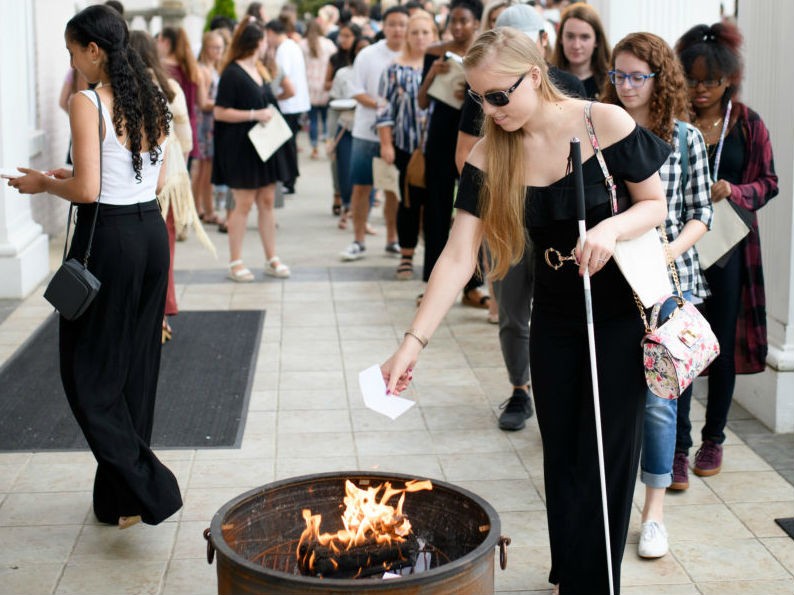For the first 14 years of her life, Maribrooke “Irina” Griffin didn’t know she was legally blind.
Diagnosed during her freshman year of high school with retinal macular dystrophy and accommodative dysfunction, Griffin is now a freshman dance major at Brenau University, and she’s not letting her visual impairment stop her.
“I was most likely born with it,” Griffin explained. “The way eyes are supposed to work is, when you have bad vision, you put a prescription over it that corrects you, ideally, to 20/20, to perfect vision. I was not getting corrected to 20/20 — I was actually not able to be corrected close to it at all.”
Griffin said she had noticed the quality of her vision slipping. The biggest change was that she had once been able to read normal-print books and, over time, no longer could.
She was referred to Emory Eye Clinic in Atlanta, where she was diagnosed legally blind. Her conditions affect the center of her vision — the portion that controls clarity and detail — because of an affected gene. They also mean her eyes do not work together, focusing separately “like a pair of binoculars” that just don’t work quite right.
Yet Griffin remains unfailingly positive. She said, “there are more perks” than downsides to her condition and every necessary accommodation she’s needed has been made possible.
One such accommodation is her white cane. These tools are more than they seem, Griffin said, and are able to be specifically personalized for each user. Tuesday, Oct. 15, marks national White Cane Safety Day, the purpose of which is to emphasize the critical role and true significance of tools in the lives of those who are visually impaired.
There are times, however, when she puts the cane aside: when she dances.
“Irina first came to us as a high-schooler during the summer dance intensive,” said John Streit, recruitment coordinator and affiliate faculty member in the Department of Dance. “She was an extremely hard worker who is quite diligent about going over steps and reviewing with me and faculty so that she can perform well for the show. Now that she is in the program as a college student, she is inquisitive and detailed, working as hard as anyone in the program with such a positive attitude.”
There are little changes she and her dance instructors have to make to ensure she can learn the steps and movements. She’s hyper-aware of being in her own space so that she doesn’t bump into anyone else. Sometimes she gets incredibly close to her instructors as they show the steps, and she learns each teachers’ “rhythm” of teaching by really listening to what they say as they teach. Other times, she gets down on the ground to see what she needs with the strongest parts of her vision.
Her instructors also know that they need to wear socks that don’t blend in with the colors of the floor, so she can see their feet contrasting as they move.
“One of the main things I love about Brenau is that it is such a small campus, which means you get that one-on-one with your professors,” Griffin said. “And for me this is really vital. I need their support because, obviously, I have this disability. Even though I am very independent, they are an extra backbone for me.
And, well, the smaller campus is obviously easier to navigate.”
Griffin has been known to walk the campus with her orientation and mobility instructor — who she acquired through her health care provider — over and over and over. Together, they started more than a year ago to walk the most common routes to get from her dormitory to her various classes and performance halls.
“He still comes here to walk with me, and we’ll walk up to the downtown square so I can practice walking the streets,” she said.
Her room in Crudup Hall includes adaptive equipment — including a computer that will speak things like her emails to her — and she studies with the help of free audiobooks specifically for the blind and visually impaired. For this reason, she doesn’t have a roommate. “If someone is not used to hearing all my speaking software, it can drive you a little crazy,” she said with a laugh.
“Irina has the most bright and positive spirit,” said Jennifer Wilson Loggins, director of the Learning Center at Brenau University. “She is like a big sunshine on campus shining her light everywhere she goes. She will often stop in just to give staff a hug and some encouragement as she goes about her busy days. It is a pleasure to have her as part of our campus community.”
It is the Learning Center’s role to ensure students like Griffin have all the academic and extracurricular accommodations they need.
“All of my tests are read to me orally and I reply orally,” Griffin said. “That’s how I did the entire ACT, too. I also sit furthest to the front in all my classes. It doesn’t do much visually, to be honest, but it does help me focus. There are just so many little things that I do.”
Loggins also ensured the placement of “blind person area” signs around campus, with the help of the city of Gainesville, to alert nearby drivers to Griffin’s presence.
Griffin may only be a freshman, but she has major career goals ahead. She credits her parents Maribeth and Walt Griffin, who adopted her and her biological sister from Ukraine, for their support. She hopes to join a dance company after graduation, then work in choreography, and finally teach, hopefully in her own studio that would support dancers with disabilities.
“Irina inspires me to continue to be authentic in who I am and what I strive to achieve,” said Madia Cooper-Ashirifi, chair of the Department of Dance. “Her commitment to work through adversity amazes me daily. I am so elated she is a part of the program, and we are so honored to support her growth in every way.”









